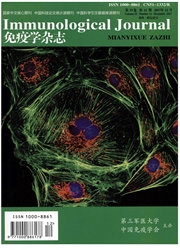

 中文摘要:
中文摘要:
目的通过对CT抗原(cancer-testis antigen)KM-HN-1进行HLA-A*0201限制性表位预测,并对候选表位肽与HLA-A*0201分子结合亲和力及复合物稳定性进行分析,为探索基于KM-HN-1的免疫治疗奠定基础。方法利用基于蛋白酶体剪切位点特异性的算法PAProc及基于肽MHC-I结合的算法BIMAS和SYFPEITHI对KM-HN-1进行HLA-A*0201限制性表位预测.合成KM-HN-1相关候选表位肽KM-HN-I321-329(KLLPFRETV),KM-HN-I303-211,(FLPTAPPNV),KM-HN-I629-637。(TLLQIIETV),KM-HN-I87-95(ILNKSIIEV),KM-HN-I538-596。(QMMEALDQL)及阳性对照肽HBVcAg18-27(FLPSDFFPSV);对这些合成肽与HIA-A*0201分子结合亲和力及其复合物稳定性根据文献报道的方法进行分析。结果KM-HN-I321-329(KLLPERETV)结合亲和力最低,KM-HN—I203-211(FLPTAPPNV)结合亲和力最高,其余3条肽结合亲和力介于2者之间;稳定性实验(DC50)结果显示:KM-HN-I538—546(QMMEALDQL)DC50小于2h,KM—HN-I321-329(KLLPERETV)的DC50介于2~4h之间,KM-HN-I87-95。(ILNKSIIEV)的DC50介于6~8h之间,KM-HN-I233-211(HLPTAPPNV)及KM-HN-I629—633(TLLQIIETV)的DC50均大于8h。结论基于蛋白酶体剪切位点特异性的算法及基于肽MHC-I结合的算法对KM-HN-1进行HLA-A*0201限制性表位预测,结合候选表位肽与HLA-A*0201分子结合的亲和力与复合物稳定性实验分析,为该抗原HLA-A*0201限制性表位的鉴定奠定了基础。
 英文摘要:
英文摘要:
Objective To predict HLA-A *0201 restricted epitopes from cancer-testis (C-T) antigen KM-HN-1 and assay the HLA-A 0201 peptide binding & complex stability of the predicted epitopes for developing cancer therapeutic vaccine based on KM-HN-1. Methods Proteasomal cleavage specificity based and peptide-MHC-I binding based algorithms were combined to predict HLA-A* 0201 restricted epitopes from antigen KM-HN-1. Peptide-MHC-I binding was predicted using 2 algorithms: BIMAS and SYFPEITHI. Proteasomal cleavage specificity was predicted using algorithm PAProc. The peptides were ranked for each algorithm and sorted by a cumulative score. Five candidate epitope peptides [KM-HN-I321-329(KLLPFRETV), KM-HN-1203_2H (FLFFAPPNV), KM-HN-I629-637 (TLLQIIETV), KM-HN-I87-95 (ILNKSI- IEV), and KM-HN-I538-546 (QMMEALDQL)] and positive control peptide were synthesized. Peptide HIA-A * 0201 binding and complex stability was assayed following previously described methods. Results KM-HN-I321-329 (KLLPFRETV) showed the lowest HLA-A * 0201 binding aflqnity among the 5 candidates, while KM-HN-I203-211 (FLFFAPPNV) was of the highest HLA-A * 0201 binding aflqnity and the rest of the peptides showed intermediate binding aflqnity. The complex stability assay indicated that the dissociation complex 50 (DC50) for KM-HN-I538-546 (QMMEALDQL) was below 2 h, the DC50 for KM-HN-I32-329 (KLLPFRETV) was 2 - 6 h, the DC50. for KM-HN-I87-95 (ILNKSIIEV) was 6 - 8 h, and the DC50 for KM-HN-I203-211(FLFFAPPNV) and KM-HN-I629-637 (TLLQIIETV) were both above 8 h. Conclusion The prediction of HLA-A * 0201 restricted epitopes from CF antigen KM-HN-1 and the peptide HLA-A * 0201 binding aflqnity & complex stability assay of the 5 candidate peptides provide experimental data for identification of HLA-A * 0201 restricted epitopes from KM-HN-1.
 同期刊论文项目
同期刊论文项目
 同项目期刊论文
同项目期刊论文
 期刊信息
期刊信息
